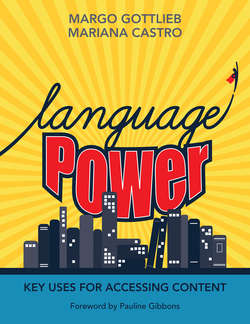Читать книгу Language Power - Margo Gottlieb - Страница 22
На сайте Литреса книга снята с продажи.
Academic Achievement
ОглавлениеIn the previous section, we explored what theory has to say about the role of academic language in learning; in this section, we focus on identifying the impact language has on academic achievement. We define academic achievement as students’ success in meeting short- or long-term goals in education in relation to their performance outcomes and challenging state academic standards. In this continuing era of assessment and accountability, educators need to be able to show evidence of academic achievement of all of their students.
Recently, research has emerged that connects academic language to academic achievement (Bailey, 2007; Francis, M. Rivera, Lesaux, Kieffer, & H. Rivera, 2006; Heppt, Henschel, & Haag, 2016; Schleppegrell, 2004). This research points to the fact that students who master the use of academic language are more successful in accessing the knowledge and information in textbooks, academic resources, and assessments (Francis et al., 2006). While students may be able to accrue knowledge without the use of academic language, as information becomes more complex, so too does language. Therefore, students who have not had experiences with using academic language have a more challenging time engaging with content in school than children who have had exposure to its use early on.
The scope of academic language is not limited to discipline-specific vocabulary but also includes grammatical forms and ways of organizing oral and written information in academic-specific ways. These conventions have been established and look differently from one discipline to another. For example, the language of sequencing the steps in solving a mathematical story problem is quite distinct from the language of sequencing the events in a biography. It becomes apparent that students use language in many different ways throughout the day. Most important, however, academic language encompasses disciplinary discourse, and key uses of academic language assist in leveraging how oral and written text is organized and communicated.
While we have known about the critical role of language in learning and in academic achievement, we often presume students already have the language needed to engage in learning or that they will acquire it through their environment or exposure. While this may be true for some language development and some of the students, an intentional focus on language use ensures that of all students are included in teaching and learning. More specifically, an intentional focus on language provides more equitable opportunities for students to interact with academic discourse and assures that all students have the tools to participate meaningfully in activities designed to mediate learning.
Remember that for ELLs and ELLs with disabilities, academic language use is not necessarily confined to English but, in fact, should be inclusive of their home language(s) as well. These students have extensive linguistic and cultural repertoires that are resources to tap in expanding their thinking, knowing, and doing. So when we speak of academic language use, we are not language specific; we wish to acknowledge and encourage the potential transferability of thoughts and actions between languages.
Take the DARE
Here are some ideas to begin thinking about academic language use in your classroom:
Identify the various ways in which language is used in texts.
Observe how students use language(s) during group work or presentations.
Record yourself, and reflect on your own use of language in your classroom.
Review student work with a focus on their use of language.
Recognize how many opportunities your students have during class to use language with each other in meaningful ways.
Document student language in your classroom environment (e.g., word, phrase, or concept walls; posters; charts; and bulletin boards).
